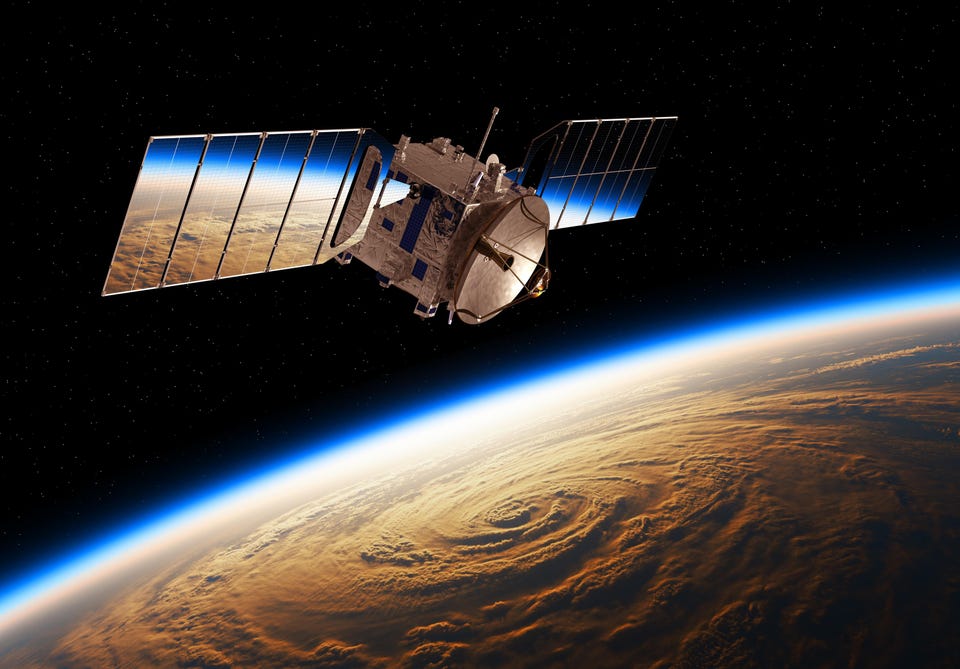Science Do We Need An ‘Internet Of Spacecraft?’ Elon Musk And Jeff Bezos Could Protect Us From Massive Asteroid Strikes Says Scientist Jamie Carter Senior Contributor Opinions expressed by Forbes Contributors are their own. I inspire people to go stargazing, watch the Moon, enjoy the night sky New! Follow this author to improve your content experience. Got it! Jul 7, 2022, 08:00pm EDT | Share to Facebook Share to Twitter Share to Linkedin It’s likely that the number of spacecraft in the solar system will increase exponentially—and many .
. . [+] of them will likely be privately owned and operated.
Can they protect us? getty What happens when a massive asteroid is headed for Earth and nobody notices? It’s the nightmare scenario—but could a “space internet” help? NASA and the other national space agencies like the Canadian Space Agency (CSA), European Space Agency and Japan’s JAXA do their best, but it’s not like there are spacecraft across the solar system constantly searching for these things. Cue Elon Musk or Jeff Bezos. Recent years have seen the commercial space industry mushroom, with the likes of Musk’s SpaceX and Bezos’ Blue Origin at the forefront of a step-change in spaceflight.
Today it’s possible to take a private spaceflight—up and down in several minutes with Blue Origin and into orbit with SpaceX—while in the far future the same companies and others could offer trips to Mars. Either way it’s likely that the number of spacecraft in the solar system will increase exponentially—and many of them will likely be privately owned and operated. A new paper published in the jornal Signals by Dr.
Yiming Huo in the Department of Electrical and Computer Engineering, University of Victoria, Canada claims that once there are fleets of private spacecraft—and possibly bases and even colonies on other planets—it would be a good idea to create a solar system-wide network to protect our species from asteroids, comets and anything else threatening our safety. The paper’s proposed Solar Communication and Defense Networks (SCADN) is nothing short of an “Internet of spacecraft. ” Consisting of a large number of distributed spacecraft capable of deep-space sensing, communications and defense, a SCADN could detect objects earlier than presently possible.
MORE FOR YOU New Research Finds A Connection Between Domestic Violence And These Two Personality Disorders This Scientist Helps Andean Forests And Ecuador’s Women In STEM Exceptional Fossil Preservation Suggests That Discovering Dinosaur DNA May Not Be Impossible Objects capable of causing extinction-level events would be the main reason to have a SCADN. “A large number of survey stations (on spacecraft) will be deployed into various orbits across the entire solar system to form an enormous internet of spacecraft (IoS) networks,” writes Huo. Take 2013’s Chelyabinsk event, the largest known natural object to have entered Earth’s atmosphere since the Tunguska event of 1908.
About 1,5000 were injured. Trail of a meteorite impact near city of Chelyabinsk, Russia, February 15, 2013. getty Why wasn’t the Chelyabinsk meteor detected before it struck? In fact, we had no chance.
The paper rather chillingly reminds us the Chelyabinsk meteor’s orbit was incredibly similar to the 2. 2-km-diameter near-Earth asteroid 86039, which was first observed in 1999. Backwards calculations revealed that 86039 had spent six weeks close to the Sun as seen from Earth—a vast region that ground-based telescopes just cannot study.
That’s why we need an “Internet of spacecraft” to monitor these objects from multiple locations in the solar system, though it wouldn’t just be about protecting life on Earth. Huo says it could also play a key role is aiding with what’s termed extra-terrestrialization—making life interplanetary—by protecting colonies on Mars and beyond. “The colonization of other celestial bodies could also fall victim to asteroid/comets impact,” he writes.
“Due to the lack of a thick atmosphere as on Earth, Mars could be more vulnerable to the impact of near-Mars objects (NMO). ” He also points out that although Jupiter and Saturn can steer some asteroids away from Earth that increases the chances of impacts on their moons including those where humans may want to colonize—such as Europa, Titan and Enceladus. Ultimately the plan would be to have multiple survey stations/spacecraft around each and every planet, each equipped with artificial intelligence (AI) and edge computing—and never again will we miss an incoming Chelyabinsk-sized meteor, wherever it’s headed.
Wishing you clear skies and wide eyes. Follow me on Twitter or LinkedIn . Check out my website or some of my other work here .
Jamie Carter Editorial Standards Print Reprints & Permissions.
From: forbes
URL: https://www.forbes.com/sites/jamiecartereurope/2022/07/07/do-we-need-an-internet-of-spacecraft-elon-musk-and-jeff-bezos-could-protect-us-all-from-massive-asteroid-strikes-says-scientist/



